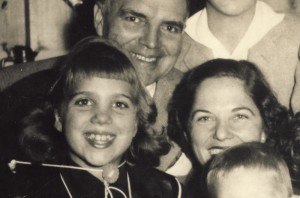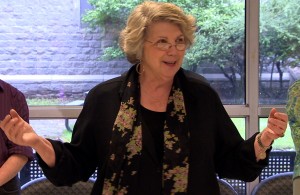ABOUT THE FILM

Now in production, Marsha: A Life Worth Living, is an intimate and deeply personal film that tells the amazing life story of Marsha Linehan, an emotionally troubled teenager who became one of the most important mental health experts in the world.
Her journey began at the age of 17, locked away in a psychiatric institution. During her two years and three months at the Institute of Living, Marsha was frequently drugged, subjected to several electroshock treatments and was regularly relegated to a locked ward and, at times, placed in complete isolation for months at a time. Nothing seemed to help. She cut and burned herself, banged her head on the walls and floor and attempted to commit suicide, all the while breaking rules and trying to escape. The more the staff tried, the worse she became until they finally concluded the best they could do for Marsha was keep her under 24/7 observation to ensure she didn’t kill herself.
It was in that isolation room that Marsha, in the depths of despair and suffering, cried for God to help her. Then she had a transcendent moment. Marsha made a solemn vow that she would get herself out of the hell she was in and then come back and help others get out as well.
And that’s exactly what she did.
Marsha would be discharged, go to college, get a doctorate in psychology, work with people as miserable as she had been and develop a treatment that has saved the lives of thousands of people so emotionally desperate that they considered suicide the answer to their misery and pain.
Through first-person interviews with Marsha, her family, friends and patients as well as vintage photos and home movies, Marsha: A Life Worth Living will document her inspiring story of personal triumph.
ABOUT MARSHA
In 1980, Marsha applied to the National Institute of Mental Health for a grant to test her therapy in a rigorous clinical trial with patients who suffered with Borderline Personality Disorder, or BPD, a severe psychiatric condition that was wide spread, little understood and extremely difficult to treat. Due to patient’s lack of progress, difficult demeanor and the ever present threat of suicide, most mental health providers at the time avoided people who suffered with BPD.
Marsha’s innovative approach, a balance of Western cognitive behavioral change strategies and Eastern philosophical concepts such as acceptance and mindfulness, proved to be successful. The treatment, which she called Dialectical Behavior Therapy, or DBT, dramatically reduced suicidal thoughts and behaviors among patients who received DBT and provided a pathway to help them build a a better life – a life worth living.
Today, Marsha Linehan is Professor of Psychology and Professor of Psychiatry and Behavioral Sciences at the University of Washington in Seattle. She is also Director of the Behavioral Research and Therapy Clinics and the founder of two organizations devoted to the dissemination of her DBT treatment, Behavioral Tech, LLC, and The Linehan Institute.
The author of several best selling books and numerous peer reviewed research studies, Marsha has received a great many accolades and awards for her work and is considered the pioneer in the treatment of Borderline Personality Disorder and self-harming behaviors. Greatly admired by her patients and many thousand others treated by DBT therapists and by her colleagues in the mental health field, Marsha Linehan’s story of personal and professional achievement is truly remarkable and inspirational.
ABOUT BORDERLINE PERSONALITY DISORDER
The prevalence of BPD in the U.S. is staggering. It has been estimated that as many as 15 million Americans have met the diagnosis of BPD in their lifetime. Because of the extreme stigma attached to BPD, there likely are many more. Despite this wide prevalence BPD remains one of the least understood and most stigmatized mental health conditions.
The effect of this lack of awareness about BPD is sobering and costly. 75% of all people diagnosed with BPD will attempt suicide at least once in their life. And 10% will die by their own hands. One out of five patients in psychiatric hospitals are admitted because of BPD symptoms and behaviors. In fact, BPD is the leading reason people seek out mental health services.
Through this cinematic telling of her personal story, Marsha A Life Worth Living will bring much needed attention to the impact that BPD has on individuals, on their families and loved ones and on society at large. In addition to documenting her remarkable life story, Marsha: A Life Worth Living will offer hope to the millions of people affected by BPD who have had little reason to feel hopeful.
ABOUT THE FILM MAKERS
Dawkins Productions has been creating award winning healthcare programs for broadcast, cable, satellite, video and internet since 1986.
We first became involved with mental health issues in 1992 when we produced four programs for the PBS series, The World of Abnormal Psychology. Since that time, we have produced more than a dozen mental health videos for Guilford Press on a wide range of topics, including BPD. We have also produced four videos for Marsha Linehan on skills training for people with Borderline Personality Disorder. Recently, we completed a comprehensive five-part video series, If Only We had Known: A Family Guide To Borderline Personality Disorder, funded by the National Institute of Mental Health, about people who have Borderline Personality Disorder and the impact it has on their families.
In making this film we want to bring Marsha’s story to light, but also to bring BPD, a widespread but mostly hidden mental illness out of the dark. Please join us in the fight to overcome the stigma against people with BPD and other psychiatric disorders, so we can begin to normalize the conversation about mental illness.
To learn more about Dawkins Productions, our work, collaborations and awards, please visit our website: www.dawkins.tv
KEVIN DAWKINS, EXECUTIVE PRODUCER.
“I first met Marsha in 1993 when we collaborated on two videos that first described her unique approach to the treatment of people diagnosed with Borderline Personality Disorder or BPD. She called that treatment Dialectical Behavior Therapy, now commonly referred to as DBT. Until the advent of DBT people with BPD were widely considered untreatable and too difficult to deal with. In fact, someone once referred to BPD as ‘the leprosy of mental illness’ and young therapists were advised to avoid BPD patients.
Specifically choosing to treat these often forgotten patients was a courageous and bold act by Marsha. That’s also a good overall description of Marsha. Not only courageous and bold, she is also compassionate and indefatigable in her work and in her life.
I have had several opportunities to work with Marsha on other BPD projects, including the five part series for families, If Only We Had Known: A Family Guide to Borderline Personality Disorder, and the Chaos to Freedom series featuring DBT skills. But none is as important as this biographical film, a highly personal account of her extraordinary experiences as a mental health patient as well as a pioneering provider.”
Kevin has made presentations on Borderline Personality Disorder at many national and regional mental health conferences and meetings, including the National Education Alliance on Borderline Personality Disorder, the National Alliance on Mental Illness and the National Institute on Mental Health. He also was Principal Investigator on seven National Institutes of Health funded research studies Dawkins Productions conducted to test the effectiveness of our programs. These include projects on BPD, depression, asthma and cystic fibrosis. Prior to founding Dawkins Productions, Kevin was a producer/writer for NBC, CBS News, WCVB-TV and several independent television production companies.
AMY GOODMAN KASS, DIRECTOR.
“I have spent my career making documentaries about individual people – both ordinary and extraordinary – who illuminate larger social issues. From female juvenile offenders, to New York City firefighters, to returning wounded Iraq War veterans, the people profiled in my projects help us to understand who we are and our place in the world.
Portraiture as an art form is what inspires me– not the chronological biography as much as the character sketch. In this film Marsha Linehan will give voice to the distorted thoughts of a person with borderline personality disorder, or BPD. Hearing her perspective is compelling for two reasons. She developed the first and most effective treatment for BPD; but equally interesting is that at age 17 she was institutionalized for similarly severe behaviors and symptoms. That experience was the genesis of her ground-breaking, and live saving, therapy”.
Amy’s award-winning work as a documentary writer/producer/director has appeared on PBS, ABC, HBO, Discovery, The Learning Channel, MTV, and Lifetime. Most recently, she was supervising producer for the four-part PBS series, America Revealed, an epic portrait of our nation’s infrastructure.
In 2010, Amy directed a five part series on families coping with Borderline Personality Disorder , If Only We Had Known, for Dawkins Productions. In 2007, Amy was coordinating producer on HBO’s Alive Day Memories: Home From Iraq, an Emmy-nominated film about returning wounded Iraq war veterans, executive produced by James Gandolfini. She worked with Academy Award-nominated filmmaker Liz Garbus, and co-produced the feature-length documentary, Girlhood, which tells the story of two violent female juvenile offenders in Baltimore; the film aired on TLC, won awards around the world and was named “one of the most important films of 2003” by LA Weekly. Amy was also a producer on The Mystery of Love (PBS, 2006) a documentary exploring the elusive title subject, and with Academy Award-nominated filmmaker, Lilibet Foster, she co-produced Brotherhood (2004), an intimate look inside the FDNY a year and a half after 9/11/01.

